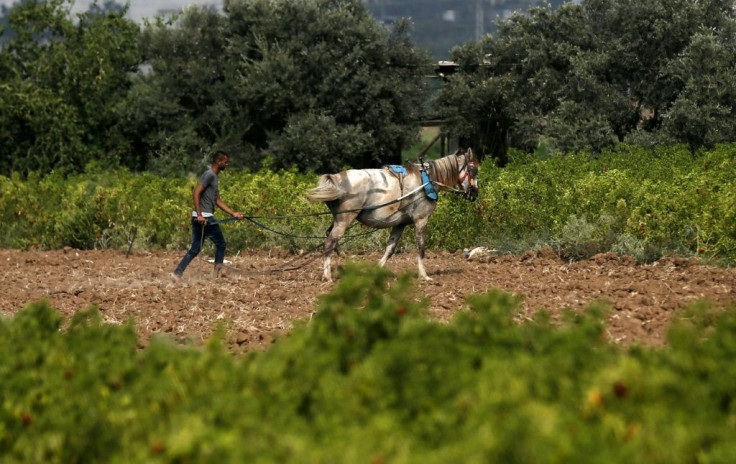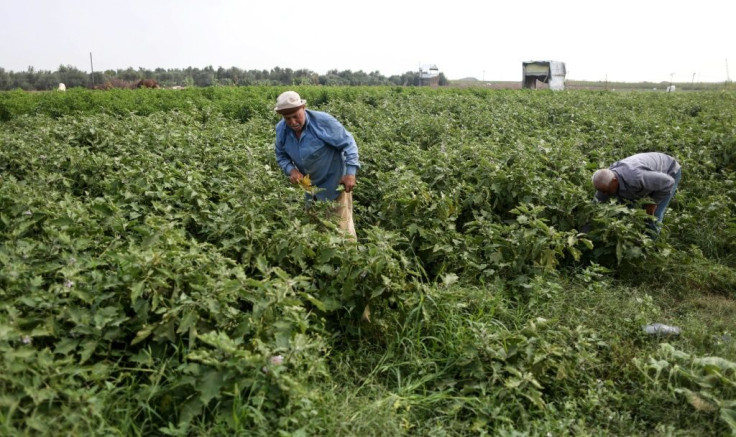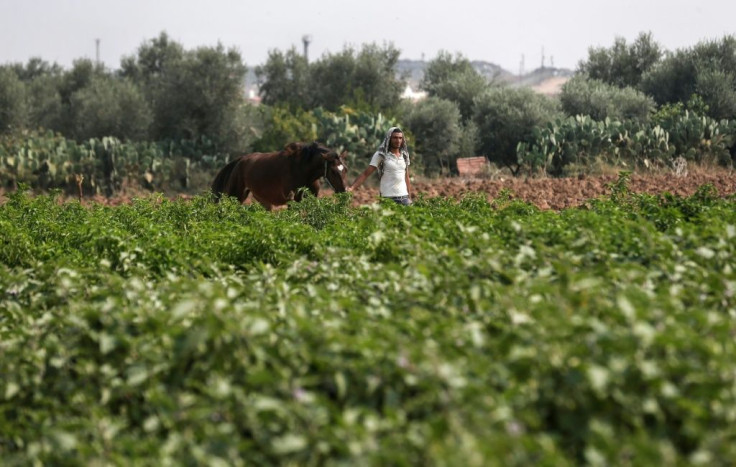Gaza Fields, Ravaged By Israeli Herbicides, Bloom Again

From his field of aubergines in the Gaza Strip Massud Habib gazes at the nearby Israeli border security barrier, squinting in the late autumn sun.
For four years, he said, Israeli planes regularly sprayed herbicides along the border which scorched his crops, and he fears it could resume at any time.
Israel says it sprays only on its side of the border, to clear a buffer zone of hiding places for potential Palestinian attackers.
Israel and the Islamist Palestinian movement Hamas, which controls the strip, have fought three wars since 2008, with regular cross-border clashes since the last round in 2014.
"They sprayed early in the morning," said Habib, his blue workshirt specked with mud.
"Why? Because the wind was in their favour, it carried everything to our side."
All the Gazan farmers said the Israelis checked the wind was with them before spraying -- meaning that each April and December for four years the air stank like a sewer.
"It caught in your throat and left you short of breath," Habib added.
Moutia Habib, a colleague, said the chemicals stripped the ground of foliage, leaving just the brick-red soil.
"After two or three days all that was green was gone," he said. "We had to start all over again, plant afresh, with no help from anybody."
Israeli NGO Gisha says that between 2014 to 2018 Israel sprayed defoliant nearly 30 times along the border fence.
In 2015 several NGOs launched legal action to stop the practice.
The Israeli defence ministry confirmed to AFP it carried out "weed control in which the material is sprayed from the air" along the Gaza border.

"The spraying is carried out from time to time, in accordance with operational requirements, and is conducted only over the territory of the State of Israel," it said in a statement.
It added the spraying was carried out by specialist companies, in accordance with Israeli law using materials approved by the ministry of agriculture.
The chemicals "are used in agricultural fields across Israel, as well as by other countries."
An analysis of a single spraying operation by Forensic Architecture, a research group based within the University of London, found that the chemicals travelled well into Gaza and at levels above recommended European Union guidelines.
"Agricultural lands more than 300m (yards)from Gaza's eastern border (with Israel) experienced damage, and with concentrations of herbicides above the recommended (EU) amounts," it wrote.

The materials used included glyphosate, which is potentially harmful for humans, the report said.
Glyphosate is classified as "probably carcinogenic" by the World Health Organisation, but the EU in December 2017 renewed the weedkiller's licence across Europe for five years.
This spring there was no spraying, but the Israeli defence ministry did not confirm that it has abandoned the practice.
His fields green once again, Habib caressed a dark purple eggplant.
"Thank God, it's much better," he said. "Look!"
Neither Israel or Gaza's agriculture ministry have offered him compensation for financial loss over the spraying, he said.
NGOs continue to press Israel to call a permanent halt to border defoliation.
"There is no justification or legal basis for continuing this extremely destructive practice," said Gisha's Shay Grunberg.
Samir Zaqout of the Palestinian human rights group Al-Mezan said such behaviour dates from Israel's withdrawal from Gaza in 2005.
"They started going back with bulldozers to clear ground or use planes for spraying," with the aim of creating a buffer zone, he said.
Despite the current lull in the spraying other hazards remain for farmers.
Those getting too close to the border fence risk being shot by Israeli troops, as Riad al-Nasser can testify.
"On June 9, 2017, I was wounded in the hand, I cannot close it, look," he shows, trying to clench his fingers with evident pain, his wrist marked by a deep scar.
He also puts forward his foot, where two toes were amputated after he was hit again in May 2018.
A clearly-visible white cap on his head, Nasser watches his workers carefully picking peppers.
He can help, but certain tasks are beyond him and his nerves are frayed.
"I'm scared, I'm uneasy when I come to work," he said, protesting he poses no threat.
"I'm only on my land."
© Copyright AFP 2024. All rights reserved.




















